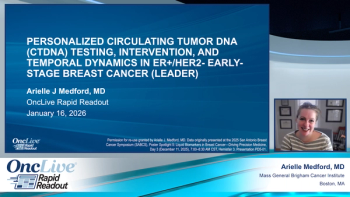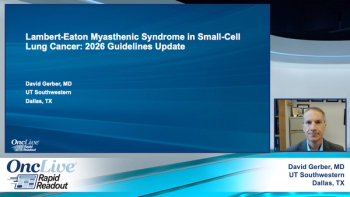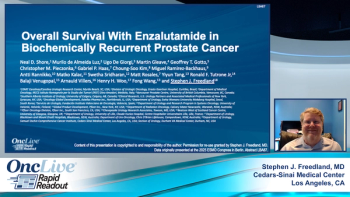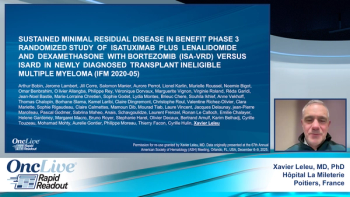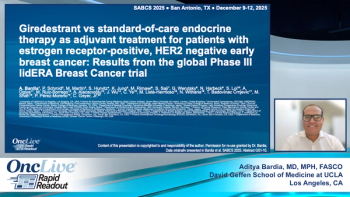
|Videos|July 1, 2021
Rapid Readouts: Results of the SCOUT and NAVIGATE Trials
David A. Reardon, MD, presents slides, shown at the 2021 American Society of Clinical Oncology Annual Meeting, from the phase 2 NAVIGATE basket trial and the phase 1/2 SCOUT trial in adult and pediatric patients with tropomyosin receptor kinase (TRK) fusion–positive primary central nervous system (CNS) tumors treated with larotrectinib with or without prior therapy.
Advertisement
David A. Reardon, MD, discusses data from the following presentation:
- Efficacy and Safety of Larotrectinib in Adult and Pediatric Patients With Tropomyosin Receptor Kinase (TRK) Fusion-Positive Primary Central Nervous System (CNS) tumors (Perreault S, ASCO 2021 Annual Meeting, Abstract #2002)
- The objective of this study is to report results from the phase 2 NAVIGATE basket trial and the phase 1/2 SCOUT trial (NCT02576431 and NCT02637687, respectively) in adult and pediatric patients with TRK fusion–positive central nervous system tumors treated with larotrectinib, a first-generation TRK inhibitor.
- Study Design
- NAVIGATE: age 12 years or older; advanced solid tumors, TRK-positive cancer (N=9)
- SCOUT: age less than21 years; locally advanced or metastatic solid tumors or CNS tumors (N=24)
- Primary end point: objective response rate (ORR) by RANO or RECIST v1.1 criteria if target lesions inadequate for RANO (n=5)
- Efficacy
- The evaluable patients (N=33) showed an ORR of 20% and a disease control rate (DCR) of 73% at greater than or equal to24 weeks; responses were durable, with a median progression-free survival (PFS) of 18.3 months and median overall survival (OS) not reached during the trial but 12-month OS rate was 85%.
- Responses were seen across patient populations (adult and pediatric) and across disease grade (low and high).
- At data cutoff, 18 patients were still receiving treatment.
- Safety
- There were limited grade 3 treatment-related adverse events (AEs), mostly neutropenia, and no grade 4 or 5 treatment-related AEs.
- There was a small number of grade 1 or 2 neurologic AEs, but most were thought to not be treatment related.
- Conclusions
- The data showed objective response and durable stable disease in patients with primary CNS tumors treated with larotrectinib, with no treatment-related safety concerns.
- The results support testing for NTRK gene fusions and consideration of TRK-targeting agents in patients with primary CNS tumors of all ages.
Advertisement
Latest CME
Advertisement
Advertisement
Trending on OncLive
1
Single-Center, Retrospective Data Show Low Rate of Lifileucel Infusion Following Referral in Advanced Melanoma
2
Real-World Data Support Clinical Benefit With Lifileucel in Previously Treated Advanced Melanoma
3
Outcomes With Bridging Therapy Correlate With Cilta-Cel Efficacy, Safety in Multiple Myeloma
4
Long-Term Cilta-Cel Data Show Low Rates of PFS Events in Standard-Risk R/R Myeloma
5


